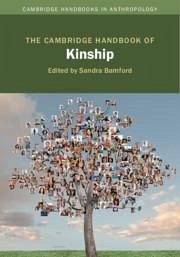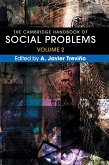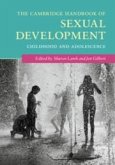The Cambridge Handbook of Kinship
Herausgeber: Bamford, Sandra
The Cambridge Handbook of Kinship
Herausgeber: Bamford, Sandra
- Gebundenes Buch
- Merkliste
- Auf die Merkliste
- Bewerten Bewerten
- Teilen
- Produkt teilen
- Produkterinnerung
- Produkterinnerung
A state-of-the-field Handbook surveying the broad range of topics, approaches and theories within kinship studies today.
Andere Kunden interessierten sich auch für
![The Cambridge Handbook of Age and Ageing The Cambridge Handbook of Age and Ageing]() Vern L. Bengtson (Associate ed.) / Peter G. Coleman / Thomas B. L. KirkwoodThe Cambridge Handbook of Age and Ageing100,99 €
Vern L. Bengtson (Associate ed.) / Peter G. Coleman / Thomas B. L. KirkwoodThe Cambridge Handbook of Age and Ageing100,99 €![The Cambridge Handbook of Environmental Sociology The Cambridge Handbook of Environmental Sociology]() The Cambridge Handbook of Environmental Sociology197,99 €
The Cambridge Handbook of Environmental Sociology197,99 €![The Cambridge Handbook of Child Language The Cambridge Handbook of Child Language]() The Cambridge Handbook of Child Language218,99 €
The Cambridge Handbook of Child Language218,99 €![The Cambridge Handbook of the International Psychology of Women The Cambridge Handbook of the International Psychology of Women]() The Cambridge Handbook of the International Psychology of Women264,99 €
The Cambridge Handbook of the International Psychology of Women264,99 €![The Cambridge Handbook of Social Problems The Cambridge Handbook of Social Problems]() The Cambridge Handbook of Social Problems212,99 €
The Cambridge Handbook of Social Problems212,99 €![The Cambridge Handbook of Sexual Development The Cambridge Handbook of Sexual Development]() The Cambridge Handbook of Sexual Development258,99 €
The Cambridge Handbook of Sexual Development258,99 €![The Cambridge Handbook of Social Problems The Cambridge Handbook of Social Problems]() The Cambridge Handbook of Social Problems177,99 €
The Cambridge Handbook of Social Problems177,99 €-
-
-
A state-of-the-field Handbook surveying the broad range of topics, approaches and theories within kinship studies today.
Hinweis: Dieser Artikel kann nur an eine deutsche Lieferadresse ausgeliefert werden.
Hinweis: Dieser Artikel kann nur an eine deutsche Lieferadresse ausgeliefert werden.
Produktdetails
- Produktdetails
- Verlag: Cambridge University Press
- Seitenzahl: 750
- Erscheinungstermin: 18. Juli 2019
- Englisch
- Abmessung: 259mm x 189mm x 50mm
- Gewicht: 1429g
- ISBN-13: 9781107041189
- ISBN-10: 110704118X
- Artikelnr.: 54440598
- Herstellerkennzeichnung
- Libri GmbH
- Europaallee 1
- 36244 Bad Hersfeld
- 06621 890
- Verlag: Cambridge University Press
- Seitenzahl: 750
- Erscheinungstermin: 18. Juli 2019
- Englisch
- Abmessung: 259mm x 189mm x 50mm
- Gewicht: 1429g
- ISBN-13: 9781107041189
- ISBN-10: 110704118X
- Artikelnr.: 54440598
- Herstellerkennzeichnung
- Libri GmbH
- Europaallee 1
- 36244 Bad Hersfeld
- 06621 890
Introduction: 1. Conceiving kinship in the twenty-first century Sandra
Bamford; Part I. Opening Frameworks: 2. The seeds of kinship theory Carol
Delaney; 3. Descent in retrospect and prospect Gillian Feeley-Harnik; 4.
The alliance theory of kinship in South Indian ethnography Isabelle
Clark-Decès; 5. The anthropology of biology: a lesson from the new kinship.
Studies Sarah Franklin; 6. The stuff of kinship Janet Carsten; Part II. The
(Non)Biological Basis of Relatedness: 7. Embodied relationality beyond
'nature' vs 'nurture': materializing absent kinships in Japanese child
welfare Kathryn Goldfarb; 8. Kinship in the Andes Mary Weismantel and Mary
Elena Wilhoit; 9. Kinship and place: the existential and moral process of
landscape formation on the Rai Coast of Papua New Guinea James Leach; 10.
Adoption Christine Gailey; 11. Natural achievements: how lesbian and gay
families in North America make claims to kinship Ellen Lewin; Part III.
Reproducing Society: Gender, Birth and Power: 12. Kinship, knowledge and
the state: the case of Argentina's adult 'living disappeared' Noa Vaisman;
13. Kinship, affliction, proximity, and unfinished healing in India Sarah
Pinto; 14. Reproductive remix: law, kinship and origin stories Valerie
Hartouni; 15. Selecting for sons: kinship as a product of desire Tine
Gammeltoft; Part IV. Transnational Connections: 16. Maids, mistresses and
wives: rethinking kinship and the domestic sphere in twenty-first-century
global Hong Kong Nicole Constable; 17. Transnational adoption J.
Leinaweaver; 18. Kinship in transnational encounters: Filipino migrants as
'ideal brides' in rural Japan Lieba Faier; 19. Un/making family:
relatedness, migration, and displacement in a global age Deborah Boehm; 20.
My folder is not a person: kinship, knowledge, biopolitics and the adoption
file Eleana Kim; Part V. Technological Conceptions: 21. Surrogate
motherhood and transforming families Janet DolginI; 22. Daphna
Birenbaum-Carmeli, Soraya Tremayne and Zeynep Gurtin - kinship and assisted
reproductive technologies: a Middle Eastern comparison Marcia Inhorn; 23. A
comparison of kinship understandings among Israeli and US surrogates Elly
Teman and Zsuzsa Berend; 24. Self, personhood and belonging: the role of
technology in childhood disability Gail Landsman; 25. Paid and unpaid
gestational labor: pregnancy and surrogacy in anthropological studies of
reproduction Tsipy Ivry and Elly Teman; Part VI. Kinship and the Nation
State: 26. Reading the contested forms of nation through the contested
forms of kinship and marriage Susan McKinnon; 27. The prison as a
technology of care in North-East Brazil Hollis Moore; 28. The interface
between kinship and politics in three different social settings Signe
Howell; 29. A global family: kinship, nations, and transnational
organizations in Botswana's time of AIDS Koreen Reece; 30. Kinship, world
religions and the nation state Fenella Cannell.
Bamford; Part I. Opening Frameworks: 2. The seeds of kinship theory Carol
Delaney; 3. Descent in retrospect and prospect Gillian Feeley-Harnik; 4.
The alliance theory of kinship in South Indian ethnography Isabelle
Clark-Decès; 5. The anthropology of biology: a lesson from the new kinship.
Studies Sarah Franklin; 6. The stuff of kinship Janet Carsten; Part II. The
(Non)Biological Basis of Relatedness: 7. Embodied relationality beyond
'nature' vs 'nurture': materializing absent kinships in Japanese child
welfare Kathryn Goldfarb; 8. Kinship in the Andes Mary Weismantel and Mary
Elena Wilhoit; 9. Kinship and place: the existential and moral process of
landscape formation on the Rai Coast of Papua New Guinea James Leach; 10.
Adoption Christine Gailey; 11. Natural achievements: how lesbian and gay
families in North America make claims to kinship Ellen Lewin; Part III.
Reproducing Society: Gender, Birth and Power: 12. Kinship, knowledge and
the state: the case of Argentina's adult 'living disappeared' Noa Vaisman;
13. Kinship, affliction, proximity, and unfinished healing in India Sarah
Pinto; 14. Reproductive remix: law, kinship and origin stories Valerie
Hartouni; 15. Selecting for sons: kinship as a product of desire Tine
Gammeltoft; Part IV. Transnational Connections: 16. Maids, mistresses and
wives: rethinking kinship and the domestic sphere in twenty-first-century
global Hong Kong Nicole Constable; 17. Transnational adoption J.
Leinaweaver; 18. Kinship in transnational encounters: Filipino migrants as
'ideal brides' in rural Japan Lieba Faier; 19. Un/making family:
relatedness, migration, and displacement in a global age Deborah Boehm; 20.
My folder is not a person: kinship, knowledge, biopolitics and the adoption
file Eleana Kim; Part V. Technological Conceptions: 21. Surrogate
motherhood and transforming families Janet DolginI; 22. Daphna
Birenbaum-Carmeli, Soraya Tremayne and Zeynep Gurtin - kinship and assisted
reproductive technologies: a Middle Eastern comparison Marcia Inhorn; 23. A
comparison of kinship understandings among Israeli and US surrogates Elly
Teman and Zsuzsa Berend; 24. Self, personhood and belonging: the role of
technology in childhood disability Gail Landsman; 25. Paid and unpaid
gestational labor: pregnancy and surrogacy in anthropological studies of
reproduction Tsipy Ivry and Elly Teman; Part VI. Kinship and the Nation
State: 26. Reading the contested forms of nation through the contested
forms of kinship and marriage Susan McKinnon; 27. The prison as a
technology of care in North-East Brazil Hollis Moore; 28. The interface
between kinship and politics in three different social settings Signe
Howell; 29. A global family: kinship, nations, and transnational
organizations in Botswana's time of AIDS Koreen Reece; 30. Kinship, world
religions and the nation state Fenella Cannell.
Introduction: 1. Conceiving kinship in the twenty-first century Sandra
Bamford; Part I. Opening Frameworks: 2. The seeds of kinship theory Carol
Delaney; 3. Descent in retrospect and prospect Gillian Feeley-Harnik; 4.
The alliance theory of kinship in South Indian ethnography Isabelle
Clark-Decès; 5. The anthropology of biology: a lesson from the new kinship.
Studies Sarah Franklin; 6. The stuff of kinship Janet Carsten; Part II. The
(Non)Biological Basis of Relatedness: 7. Embodied relationality beyond
'nature' vs 'nurture': materializing absent kinships in Japanese child
welfare Kathryn Goldfarb; 8. Kinship in the Andes Mary Weismantel and Mary
Elena Wilhoit; 9. Kinship and place: the existential and moral process of
landscape formation on the Rai Coast of Papua New Guinea James Leach; 10.
Adoption Christine Gailey; 11. Natural achievements: how lesbian and gay
families in North America make claims to kinship Ellen Lewin; Part III.
Reproducing Society: Gender, Birth and Power: 12. Kinship, knowledge and
the state: the case of Argentina's adult 'living disappeared' Noa Vaisman;
13. Kinship, affliction, proximity, and unfinished healing in India Sarah
Pinto; 14. Reproductive remix: law, kinship and origin stories Valerie
Hartouni; 15. Selecting for sons: kinship as a product of desire Tine
Gammeltoft; Part IV. Transnational Connections: 16. Maids, mistresses and
wives: rethinking kinship and the domestic sphere in twenty-first-century
global Hong Kong Nicole Constable; 17. Transnational adoption J.
Leinaweaver; 18. Kinship in transnational encounters: Filipino migrants as
'ideal brides' in rural Japan Lieba Faier; 19. Un/making family:
relatedness, migration, and displacement in a global age Deborah Boehm; 20.
My folder is not a person: kinship, knowledge, biopolitics and the adoption
file Eleana Kim; Part V. Technological Conceptions: 21. Surrogate
motherhood and transforming families Janet DolginI; 22. Daphna
Birenbaum-Carmeli, Soraya Tremayne and Zeynep Gurtin - kinship and assisted
reproductive technologies: a Middle Eastern comparison Marcia Inhorn; 23. A
comparison of kinship understandings among Israeli and US surrogates Elly
Teman and Zsuzsa Berend; 24. Self, personhood and belonging: the role of
technology in childhood disability Gail Landsman; 25. Paid and unpaid
gestational labor: pregnancy and surrogacy in anthropological studies of
reproduction Tsipy Ivry and Elly Teman; Part VI. Kinship and the Nation
State: 26. Reading the contested forms of nation through the contested
forms of kinship and marriage Susan McKinnon; 27. The prison as a
technology of care in North-East Brazil Hollis Moore; 28. The interface
between kinship and politics in three different social settings Signe
Howell; 29. A global family: kinship, nations, and transnational
organizations in Botswana's time of AIDS Koreen Reece; 30. Kinship, world
religions and the nation state Fenella Cannell.
Bamford; Part I. Opening Frameworks: 2. The seeds of kinship theory Carol
Delaney; 3. Descent in retrospect and prospect Gillian Feeley-Harnik; 4.
The alliance theory of kinship in South Indian ethnography Isabelle
Clark-Decès; 5. The anthropology of biology: a lesson from the new kinship.
Studies Sarah Franklin; 6. The stuff of kinship Janet Carsten; Part II. The
(Non)Biological Basis of Relatedness: 7. Embodied relationality beyond
'nature' vs 'nurture': materializing absent kinships in Japanese child
welfare Kathryn Goldfarb; 8. Kinship in the Andes Mary Weismantel and Mary
Elena Wilhoit; 9. Kinship and place: the existential and moral process of
landscape formation on the Rai Coast of Papua New Guinea James Leach; 10.
Adoption Christine Gailey; 11. Natural achievements: how lesbian and gay
families in North America make claims to kinship Ellen Lewin; Part III.
Reproducing Society: Gender, Birth and Power: 12. Kinship, knowledge and
the state: the case of Argentina's adult 'living disappeared' Noa Vaisman;
13. Kinship, affliction, proximity, and unfinished healing in India Sarah
Pinto; 14. Reproductive remix: law, kinship and origin stories Valerie
Hartouni; 15. Selecting for sons: kinship as a product of desire Tine
Gammeltoft; Part IV. Transnational Connections: 16. Maids, mistresses and
wives: rethinking kinship and the domestic sphere in twenty-first-century
global Hong Kong Nicole Constable; 17. Transnational adoption J.
Leinaweaver; 18. Kinship in transnational encounters: Filipino migrants as
'ideal brides' in rural Japan Lieba Faier; 19. Un/making family:
relatedness, migration, and displacement in a global age Deborah Boehm; 20.
My folder is not a person: kinship, knowledge, biopolitics and the adoption
file Eleana Kim; Part V. Technological Conceptions: 21. Surrogate
motherhood and transforming families Janet DolginI; 22. Daphna
Birenbaum-Carmeli, Soraya Tremayne and Zeynep Gurtin - kinship and assisted
reproductive technologies: a Middle Eastern comparison Marcia Inhorn; 23. A
comparison of kinship understandings among Israeli and US surrogates Elly
Teman and Zsuzsa Berend; 24. Self, personhood and belonging: the role of
technology in childhood disability Gail Landsman; 25. Paid and unpaid
gestational labor: pregnancy and surrogacy in anthropological studies of
reproduction Tsipy Ivry and Elly Teman; Part VI. Kinship and the Nation
State: 26. Reading the contested forms of nation through the contested
forms of kinship and marriage Susan McKinnon; 27. The prison as a
technology of care in North-East Brazil Hollis Moore; 28. The interface
between kinship and politics in three different social settings Signe
Howell; 29. A global family: kinship, nations, and transnational
organizations in Botswana's time of AIDS Koreen Reece; 30. Kinship, world
religions and the nation state Fenella Cannell.








